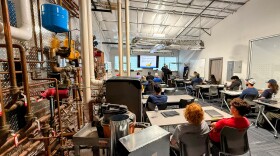-
It’s been one of the warmest winters Denver’s ever seen, setting a record for the most 60-degree days this winter. That’s triggered some early blooms at the Denver Botanic Gardens.
-
This year’s Winter Olympics have provided plenty of thrilling moments for viewers. But many of those moments are happening on machine-made snow – which can make ski or snowboard races faster, and also riskier. Today on In The NoCo: How artificial snow is changing winter sports, and how athletes and coaches are adapting.
-
Colorado and other Western states are experiencing the worst snow drought in decades, not because of dry conditions but really warm temperatures that change snow to rain.
-
Scientists were quick to speak out following the Trump administration’s plans to break up the National Center for Atmospheric Research in Boulder.
-
The judge agreed with an argument from the Association of Home Appliance Manufacturers, a trade group, that the law likely violates their First Amendment rights.
-
An apprenticeship program in Colorado and the Mountain West teaches agriculture students to farm and ranch for more extreme weather.
-
Higher education is teaming up with skilled trade industries in Colorado’s High Country to grow the rural climate workforce of tomorrow.
-
Climate change impacts many facets of nature – including the timing of when wildflowers, bees and other species emerge in the spring. A new study out of CU Boulder finds that some plants and pollinators on Pikes Peak have fallen out of sync with each other.
-
Three studies of the Pacific Ocean conclude that lower precipitation isn’t just due to natural causes.
-
Yale's Climate Opinion Maps now include questions asking Americans about specific extreme weather events like wildfires and floods and how they relate to climate change. More than other Mountain West states, Colorado residents link climate change to these severe weather events.

Play Live Radio
Next Up:
0:00
0:00
Available On Air Stations










